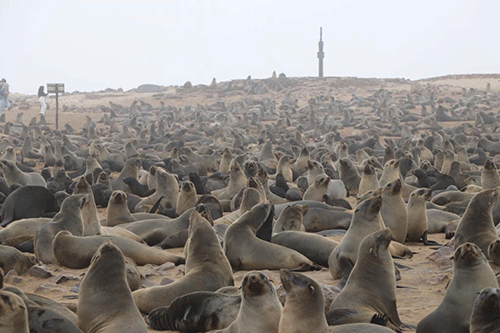Conservationists in Namibia, who are unhappy about the government’s decision to harvest 86 000 Cape fur seals during the 2023 harvesting season, say that they are determined to carry on their quest to rescue seals while reducing plastic pollution in the ocean.
The government of Namibia supports the harvesting, for the reason that the seal population may damage the fishing industry which is strategic to the Namibian economy.
It recently approved the total allowable catch that will see 80 000 pups and 6 000 bulls being harvested during the 2023 harvesting season, which will run from 1 July to 15 November in Namibia.
In an interview with Xinhua, Naude Dreyer, co-founder of Oceans Conservation Namibia, a non-governmental organisation, described the decision as desolate.
“We are always very disheartened when we hear the seal harvest announcements. For the last few years, the allocated numbers have been the same, however, the market for the pelts (which the pups are harvested for) has totally collapsed, so it has been mainly the bulls that have been targeted over recent years,” said Dreyer.
Dreyer runs a private initiative that rescues marine animals, mainly seals from entanglement in plastic pollution as well as focusing on the reduction of plastic pollution in the ocean.
“The big common notion is that there are too many seals. This is not true at all. The ecosystem will always balance itself out, and the fact that there are so many seals is a sign that the system is healthy. So, in short, no - the harvest is not necessary to balance the ecosystem at all. The depletion of fish stocks is caused by overfishing, not seals,” he explained to Xinhua.
Romeo Muyunda, a spokesperson for the Ministry of Environment, Forestry, and Tourism, said seals are important to tourism, but excessive numbers may be detrimental to their existence and the country’s fish stocks. “It is important therefore that their numbers are managed,” he said.
According to Dreyer, the continual harvesting does not deter them from doing their conservation work.
“It just makes us more determined to keep doing what we are doing to increase the welfare of our Cape fur seals,” he said, adding that most trapped seals are mainly affected by discarded fishing gear and plastics.
“We use social media as a tool to raise awareness. We catch and free around 700 seals per year,” he further said.
Dreyer also hoped to see the government fulfil its pledge to end single-use plastics in Namibia and enforce as well as monitor stricter laws on the dumping of waste in the ocean.
Namibia’s coastline is home to the Cape Cross Seal Reserve, which is one of the largest settlements of Cape fur seals in the world. Namibia has half of an estimated 1.5 million to two million population, while the remainder lives in South Africa and Angola.
- Nampa/Xinhua


